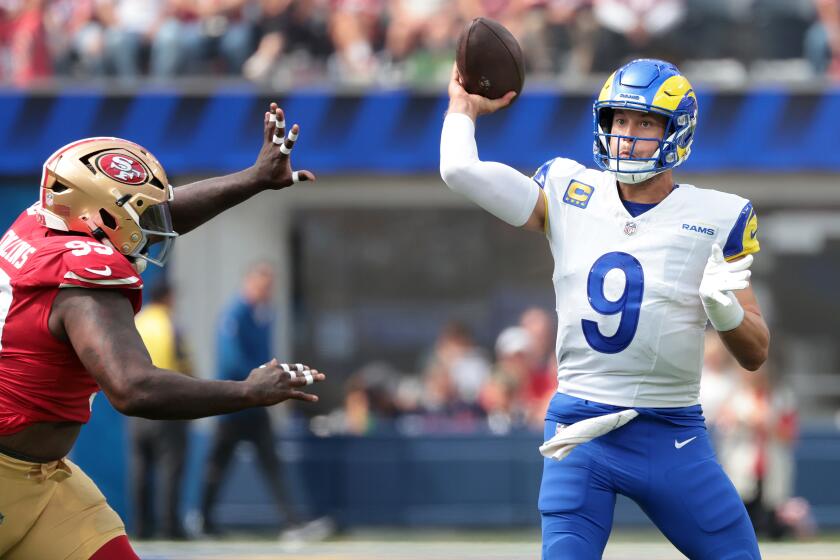Only Buffalo Bills Have Sense of the Direction the Eagles Fly
- Share via
In most walks of life, people use a watch, a clock, a calendar, a day planner. In the NFL, teams, coaches and players mark the passage of time with losses by the Philadelphia Eagles in the NFC championship game.
January 2002: While the Eagles are losing to St. Louis in the NFC championship game, the New England Patriots are qualifying for the Super Bowl, the game that would make Tom Brady famous. Meanwhile, the Carolina Panthers are mulling what to do after a 1-15 season.
January 2003: While the Eagles are losing to Tampa Bay in the NFC championship game, the Patriots are reviewing what worked during that championship season and what didn’t during the 9-7 sequel, plotting a course correction. Meanwhile, the Panthers are mulling what to do after a 7-9 season.
January 2004: While the Eagles are losing to Carolina in the NFC championship game, the Patriots are concluding a 14-0 late-season run and an AFC championship game victory over Indianapolis. Course corrected. Meanwhile, the Panthers are mulling what to do with their spare time during Super Bowl week in Houston.
The Eagles are making the Buffalo Bills look like overachievers. The Bills lost four consecutive Super Bowls in the 1990s, accomplishing what had been presumed impossible: losing the ultimate game four times, one ultimate game after another. But at least the Bills won the sort-of-big-one four times during the span, something the Eagles haven’t done since (more marking of time passage here) since January 1981, when Dick Vermeil was still two retirements removed from Kansas City.
Making matters worse, from the Philadelphia perspective, the Eagles have gotten progressively worse in NFC championship games.
Two years ago, they lost to the Rams, by five points, in St. Louis, back when Mike Martz was considered a football genius and Kurt Warner an unstoppable force on offense. Remember those golden oldies? Youngsters today might have trouble believing it, but back then, all those months ago, the Eagles’ performance in their 29-24 loss was roundly regarded as admirable.
Last year, the Eagles lost to the Buccaneers, by 17 points, at home. Uh oh. Not good. In Philadelphia, there were rumblings. But the Eagles benefited from some revisionism when Tampa Bay stormed the Oakland Raiders in the Super Bowl to stake its claim to the league’s next great dynasty (another classic blast from the past!). You know, looking back, by comparison, the Eagles looked pretty good against the Buccaneers.
Sunday, the Eagles found themselves almost out of alibis. Almost. They still have those sorry excuses for receivers, whose inability to run fundamental pass routes and hold onto the football proved more damaging to Donovan McNabb than the rib injury that eventually knocked the quarterback out of the game.
Two years after having won one game in an entire season, Carolina took the NFC championship game in Philadelphia, 14-3. This involved an Eagle loss to a team directed by Jake Delhomme, who might not be the most improbable quarterback to start a Super Bowl, not in a league in which Trent Dilfer has won it all, but to darken the Eagles’ day that much more:
During the 2001 season, with McNabb en route to his first NFC championship game loss, Delhomme did not play a down for the New Orleans Saints. A year later, he threw all of 10 passes for the Saints. Before 2003, when the Panthers signed Delhomme as backup insurance for Rodney Peete, Delhomme had a total of two NFL starts to his credit.
But this is the state of the Super Bowl, and the NFL, in early 2004:
Delhomme is in the Super Bowl in his first try ... and McNabb is 0-3 in conference championships.
Ricky Manning Jr. is in the Super Bowl in his first try ... and Peyton Manning will be watching the game at home again.
Along with parkas on the sidelines and teeth-rattling tackles all over the field, a theme common to both of Sunday’s conference title games was interceptions involving players named Manning.
Ricky, rookie Carolina cornerback by way of UCLA: three interceptions, each of them thwarting an important Philadelphia drive.
Peyton, NFL co-most valuable player: four intercepted passes, three of them thrown to Ty Law during Indianapolis’ 24-14 loss at New England.
Law is one of only two Patriots chosen to play in this season’s Pro Bowl, which seems a bit low for a team that just recorded its 14th consecutive victory, the equivalent of a perfect regular season three decades ago. Only one team completed a 14-game regular season undefeated -- the 1972 Miami Dolphins -- and only the ’72 Dolphins and the 2003 Patriots have as many as 14 consecutive victories during one season.
But maybe that’s a good thing. Pro Bowl invitations didn’t do much for Peyton Manning and McNabb, who produced passer ratings of 35.5 and 19.3 while combining for seven interceptions and one touchdown pass Sunday.
The Panthers had three players selected to the Pro Bowl, but one was punter Todd Sauerbrun. Like the Patriots, the Panthers had two of their 22 starters chosen -- running back Stephen Davis and defensive tackle Kris Jenkins.
No, the road to Super Bowl neatly avoided Honolulu this time.
This time, the Super Bowl has been overrun by grunts and grinders and role players. If not for Brady, there wouldn’t be a marquee player among them.
But this year, the marquee is located in Houston. Blue-collar plays in Houston. If New England and Carolina are the best the NFL has to offer -- and nothing that happened Sunday disputed it -- then the Super Bowl has come to the right place.
More to Read
Go beyond the scoreboard
Get the latest on L.A.'s teams in the daily Sports Report newsletter.
You may occasionally receive promotional content from the Los Angeles Times.










